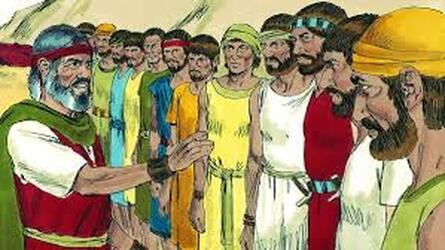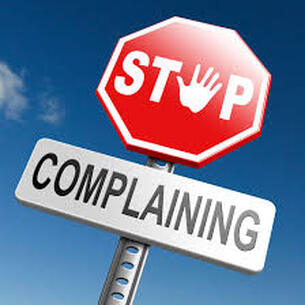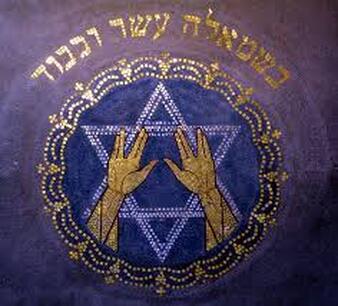
... אפס כי־עז העם הישׁב בארץ והערים בצרות גדלת מאד וגם־ילדי הענק ראינו שׁם׃
׃ והאנשׁים אשׁר־עלו עמו אמרו לא נוכל לעלות אל־העם כי־חזק הוא ממנו
What they told him was this: "We entered the land where you sent us, and indeed it does flow with milk and honey -- here is its fruit! However the people living in the land are fierce, and the cities are fortified and very large. Moreover, we saw the `Anakim there. …. "We can't attack those people, because they are stronger than we are";
(Num 13:27-28, 31 CJB)
THE SPIES AND US.
As usual, from the standpoint of our very mature understanding of the Torah and from the perspective of our very pious lifestyle (sarcasm intended), it is very easy to judge, and even condemn the people in the Tanach who didn't seem to come up to the plate in following HaShem's command. But would we have been part of the Promised Land scouting team, would we have come back like Joshua and Caleb, or been like the 10 other spies?
A talmudic rabbi (I forgot his name) wrote that we shouldn't criticise others if we cannot see the same sin we criticise them for in ourselves. The reason for that is that it is the only way that our judgment can be mixed with empathy and mercy. After all, our own Master Yeshua is the very example of this principle. HaShem did establish Him as our great judge,
The Father does not judge anyone but has entrusted all judgment to the Son, (Joh 5:22 CJB)
But not until He took upon Himself the guilt of all humanity.
So to really understand what happened with the spies, to really draw a proper conclusion, we need to see to be to internalise the fault of the spies. But what was that fault? I am sure everybody has their own ideas but here is what I would like to propose.
SELF-DEPRECATION.
The apostle teaches us that we should be humble. He tells us to
Do nothing out of rivalry or vanity; but, in humility, regard each other as better than yourselves -- (Php 2:3 CJB)
Whereas it is a healthy behavior to own, we should never apply at the cost of deprecating our own value. The spies commented,
We saw the N'filim, the descendants of `Anak, who was from the N'filim; to ourselves we looked like grasshoppers by comparison, and we looked that way to them too!" (Num 13:33 CJB)
The spies saw themselves not only as smaller but unworthy of HaShem's big prize.
THE ANTIDOTE FOR AN INFERIORITY COMPLEX.
A backlash of the proliferation of social media is that many people spend their lives anxious of the approval of others. Such a person's self-esteem becomes relative to the whims of those who surround him. This is a form of idolatry because it is giving the control of your person to others instead of to HaShem. There is no rest for the person who does that.
We need to also remember the words of the Master,
"You people make yourselves look righteous to others, but God knows your hearts; what people regard highly is an abomination before God! (Luk 16:15 CJB)
Here is the antidote for a misplaced inferiority complex. Ask yourself the question, "How much should a stranger's life be worth for you to be ready to sacrifice your only child, the one you love, for them?" After you have answered this question, remember that this is what HaShem has done for each of us as individuals.
OOOOOOOH, THAT EVIL INCLINATION!
The reasoning behind refusing to go and conquer the Land was this,
But the men who had gone with him said, "We can't attack those people, because they are stronger than we are"; (Num 13:31 CJB)
Among the many reasons why they may have this way, the Chofetz Chayim points that, "The evil inclination tries in every possible way to prevent a person from doing good deeds." Such ways are:
Arrogance:
- There are times when people feel they have done enough. They have reached the pinnacle of their accomplishment and shouldn't be asked anymore. They've done enough. They should be allowed to retire from serving HaShem.
- There are also times when someone is so guilt-ridden that he feels that he is not worthy of the great task HaShem wants to accomplish through them. They have repented, changed, but their self-inflicted guilt keeps them from launching out on to great mission HaShem has for them.
Drawing Wrong Conclusions:
It is said of our Master that,
He will be inspired by fearing Adonai. He will not judge by what his eyes see or decide by what his ears hear, but he will judge the impoverished justly; he will decide fairly for the humble of the land. He will strike the land with a rod from his mouth and slay the wicked with a breath from his lips. (Isa 11:3-4 CJB)
In essence this means that He will not draw wrong conclusions from His observations. The spies’ observations concerning the size of the Giants were right, but their conclusion were wrong.
It is very common for us to quickly judge people and situations according to the seeing of our eyes and the hearing of the ear, and we can be sorely wrong by doing that. Nothing illustrates this so much as all the wrong convictions that plague our justice system. Though every conviction needs to be corroborated by unshakable evidence, we quite often get it wrong.
Also, whether they be teachers, leaders, or politicians, how many people do we erroneously lift up just because they tell a good story or their demeanor is appealing to us? On the other hand, how many others do we put down just because of our erroneous conclusions concerning their looks and attitude? The same was the fate of the Master!
For before him he grew up like a young plant, like a root out of dry ground. He was not well-formed or especially handsome; we saw him, but his appearance did not attract us. People despised and avoided him, a man of pains, well acquainted with illness. Like someone from whom people turn their faces, he was despised; we did not value him. In fact, it was our diseases he bore, our pains from which he suffered; yet we regarded him as punished, stricken and afflicted by God. But he was wounded because of our crimes, crushed because of our sins; the disciplining that makes us whole fell on him, and by his bruises [Or: and in fellowship with him] we are healed. (Isa 53:2-5 CJB)
A Lack of Humility:
All this caused the spies to despise the Promised Land. It is nothing new. Many people criticize and despise it till this day. Life in Israel is not always easy especially if you come from a country like America. It can make one criticise the place HaShem has chosen to write His Name in.
Rabbi Moshe of Lelov one day met someone who was very critical of Israel. Unable to contain himself, the old rabbi corrected the person with, "The Torah says that the Land is very good. When does someone find that the Land? When he fulfills the Mishnah (Pirkey Avot 4:4) of, 'Be very, very humble!' When someone has the trait of arrogance, he will not be satisfied and will complain about the Land." (Cited in Otzer Chayim)
What are the typical traits of the arrogant person?
- He wants things to be exactly as he wants them.
- He lacks patience
- He gets frustrated which causes him
- Much discontentment and inappreciation of the Land.
On the other hand, a humble person:
- Doesn't mind going with the flow when things don't go right
- Focuses on the positive in every situation
- Finds the good in each and every circumstance
- Appreciates the spiritual reality of the Land and so is able to enjoy it.
In essence, a person of humility, a person who enjoys the Land, is much like the person Ya,'akov describes,
But the wisdom from above is, first of all,
pure,
then peaceful,
kind,
open to reason,
full of mercy and good fruits,
without partiality and without hypocrisy.
And peacemakers who sow seed in peace raise a harvest of righteousness.
(Jas 3:17-18 CJB)
May we all be that person!
R’ Gavriel



 RSS Feed
RSS Feed